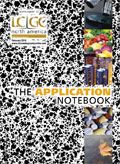Preparing for Pittcon 2010
The Application Notebook
There is an old axiom, attributed to various individuals, that holds: "Luck favors the prepared." This can apply to nearly any endeavor or project in life, as generally speaking, the harder you work, the more likely it is that good things will happen.
There is an old axiom, attributed to various individuals, that holds: "Luck favors the prepared." This can apply to nearly any endeavor or project in life, as generally speaking, the harder you work, the more likely it is that good things will happen. In fact, it is this idea that led to another memorable quote from author Anne Tyler, who famously said: "People always call it luck when you've acted more sensibly than they have."

Michael J. Tessalone
Considering the amount of hard work and preparation myself and the staff of LCGC have put into this year's Pittcon, I would have to say that we expect to have a very lucky Pittcon 2010 when the annual conference and tradeshow opens at the Orange County Convention Center in Orlando, Florida on February 28. Perhaps the greatest amount of preparation went into our first foray into the field of live broadcasting: The LCGC Podcast Theater, set to run Monday, March 1 through Wednesday, March 3 at Booth #2805 in the convention center. The first two days of the theater will see a lineup of the industry's most respected and well-known experts speaking on topics from HPLC/UHPLC to GC to GC–MS and LC–MS, bringing listeners the latest cutting-edge information on the field of separation science. The third day will be dedicated to the launch of LCGC's new online social networking and training site, CHROMacademy, and will also feature speakers from all areas of chromatography. When you add to this Monday's Third Annual LCGC Awards press conference, which will run from 2–3 pm in Room 303ABC, it is fair to say that LCGC will be looking forward to a very fortunate and successful Pittcon indeed. We invite any and all of our readers to stop by these events and see all that LCGC has to offer at Pittcon 2010.
Finally, I would be remiss if I failed to note that the current edition of The Application Notebook that you are holding in your hands is also a tribute to the preparation and hard work put in by the staff of LCGC, and as always, we invite you to give us your feedback, whether in person at Pittcon 2010 or via e-mail at the addresses in the masthead.
Enjoy the issue, and we look forward to seeing you in Orlando.

Michael J. Tessalone
Science Group Publisher

Fundamentals of Benchtop GC–MS Data Analysis and Terminology
April 5th 2025In this installment, we will review the fundamental terminology and data analysis principles in benchtop GC–MS. We will compare the three modes of analysis—full scan, extracted ion chromatograms, and selected ion monitoring—and see how each is used for quantitative and quantitative analysis.
Characterizing Plant Polysaccharides Using Size-Exclusion Chromatography
April 4th 2025With green chemistry becoming more standardized, Leena Pitkänen of Aalto University analyzed how useful size-exclusion chromatography (SEC) and asymmetric flow field-flow fractionation (AF4) could be in characterizing plant polysaccharides.
This information is supplementary to the article “Accelerating Monoclonal Antibody Quality Control: The Role of LC–MS in Upstream Bioprocessing”, which was published in the May 2025 issue of Current Trends in Mass Spectrometry.



















